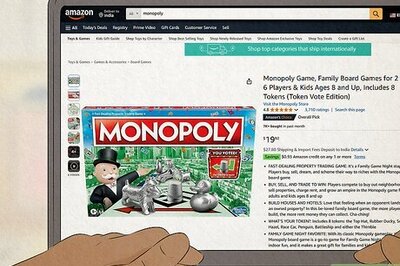
views
New Delhi: Savio Medeira began his customary post-match conference by pointing out that he had achieved double success in the SAFF Cup.
“It feels great,” he said after India’s 4-0 victory over Afghanistan in the final on Sunday. “I am even more happy and proud because I have now won this tournament both as a player (in 1997 in Kathmandu) and as a coach.”
The irony was that he had to point this out to the 50-odd football journalists assembled in that room, instead of the other way around. In a way though, that has been a characteristic of an unassuming Medeira’s entire career in the sport.
The former Salgaocar player-turned-coach was no one’s first choice to take over the reins of the Indian national team. Seeking to find a long-term replacement for Bob Houghton, the AIFF failed to retain Armando Colaco, nor could they lure current Salgaocar boss Karim Bencherifa; and so they settled on the unheralded Medeira, who had been India’s assistant coach for three-odd years.
Serious questions were asked about his capabilities to take the team forward, and after a draw and a win in his first two games against Malaysia, the 5-0 thrashing by Zambia in a friendly only increased the pressure.
Unfazed, Medeira said, “Coaching the Indian team is a big honour, but with that comes responsibility, because we are representing the country. There is pressure as well, but I knew that when I took up the job.”
Still, the Goan was clearly relieved after the SAFF Cup victory, his first in a major tournament as national coach. The win did not come easy, however, with the Afghans threatening to upset their higher-ranked hosts, before a red card and penalty in the second half opened up the game for India.
“We didn’t play well in the first half and Afghanistan put a lot of pressure on us and didn’t allow us any time on the ball,” reflected Medeira. “We couldn’t play our game. When we started lobbying the ball, their physical strength helped them counter it.”
“We went back to the drawing board in the break and in the second half, we kept the ball more on the ground and used the flanks. It helped us to come back into the match. My boys picked up their game in the second half and I couldn't have asked for anything better.”
Medeira also highlighted the other challenge his team had faced, coming into the Championships. “We didn't have any practice before this tournament and our strikers (Sunil Chhetri and Jeje Lalpekhula) came just a day before the match, so my players performed exceptionally well to win this.”
Praising his under-fire defence, he added, “Let us remember that the defence is always the last line. We conceded just two goals in five matches in this tournament. I think they were very good.”
The pressure in unlikely to ease off on Medeira, however, and the 46-year-old knows it. After all, this is a time of transition for the Indian team. Bhaichung Bhutia retired earlier this year, while other senior players like Climax Lawrence, Mahesh Gawli and Samir Naik are nearing the end of their careers.
Medeira did not give the younger players too much playing time in the SAFF Cup, but he explained his selection saying, “Dika [Lalrindika Ralte] is just 19, Jewel [Raja] is 21, Joaquim [Abranches] is 26. So they are all young. The idea was to bring together these youngsters with the senior players to form a right mix in the squad, and allow them to learn from their experience. It’s not just about playing.”
“Also, while I could give more players a chance in the friendlies against Malaysia, in a tournament there is no time to experiment, especially when you have to play matches on alternate days. But they are training well and whenever I called upon them, they have done well, so that is a positive sign for the future.”
Medeira also has plans for the team’s future. “Now that we have done well in the South Asian region, we have to aim to do better in the Asian region as well. If we improve step-by-step, I think we can go a long way.”
The immediate goal is the AFC Challenge Cup that will take place in Nepal in March next year, a tournament that India won in 2008 under Bob Houghton’s successful reign. Comparisons with the Englishman are inevitable, but Medeira is not concerned.
“Every coach has his own thinking. There are many things I learnt from Bob. However, I do my own things also. Most importantly, the players understand what I want from them.”
Medeira, though, does not have a lot of time to impose his own style and ideas, or in fact, even build a team for the future, with his contract running out in May 2012.
“No coach can do wonders within a year, and my contract is not even that long – It is just for seven months. I took it up as a challenge and so far, everything has gone well. Now it is time focus on the AFC Challenge Cup. If we do well there, who knows? I might get an extension and get to build on this success,” he said.
Until then, the questions will not go away, but the quiet, bespectacled Medeira is used to that.
















Comments
0 comment